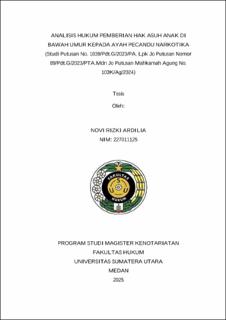| dc.contributor.advisor | Purba, Hasim | |
| dc.contributor.advisor | Sembiring, Rosnidar | |
| dc.contributor.author | Ardilia, Novi Rizki | |
| dc.date.accessioned | 2025-07-23T01:55:51Z | |
| dc.date.available | 2025-07-23T01:55:51Z | |
| dc.date.issued | 2025 | |
| dc.identifier.uri | https://repositori.usu.ac.id/handle/123456789/106262 | |
| dc.description.abstract | Child custody (hadhanah) for minors, as one of the legal consequences of divorce, is regulated in Article 105 of the Compilation of Islamic Law (KHI), which stipulates that the care of children who are not yet mumayyiz (under 12 years old) is the right of the biological mother. This study explores the following issues: What is the concept of custody rights according to Law No. 35 of 2014 on Child Protection and the Compilation of Islamic Law? What are the legal considerations of the judges in granting custody of a minor to a narcotics-addicted father in Decision No. 1039/Pdt.G/2023/PA.Lpk Jo Decision No. 89/Pdt.G/2023/PTA.Mdn Jo Supreme Court Decision No. 103K/Ag/2024? And what are the implications of this judicial decision?
This research is a normative juridical study, employing a method based on legal norms through literature review to obtain secondary data from primary, secondary, and tertiary legal materials related to the issues discussed. The study is descriptive-analytical in nature. Data were collected through literature study, and analyzed qualitatively.
The findings show that the concept of child custody under Law No. 35 of 2014 on Child Protection primarily emphasizes legal protection for children, while the concept under KHI outlines parental authority in detail. The judges' consideration in granting custody of a minor to a narcotics-addicted father in Decision No. 1039/Pdt.G/2023/PA.Lpk was based on the respondent's statement and witness testimonies indicating that the plaintiff, the mother, was often out of town due to her work obligations. The legal consideration also referred to Supreme Court Jurisprudence No. 110K/AG/2007. However, the appellate court found that the initial ruling deviated from the normative provisions of Article 105 letter (a) of KHI. In Supreme Court Decision No. 103K/Ag/2024, the panel of judges rejected the respondent's cassation appeal, concluding that the appellate court's decision did not contradict existing laws. Based on the above, the researcher concludes that the ruling by the High Court aligns with Article 105 letter (a) of KHI. Nonetheless, the implication of granting custody of a minor to a narcotics-addicted father may negatively affect the child's growth and development. | en_US |
| dc.language.iso | id | en_US |
| dc.publisher | Universitas Sumatera Utara | en_US |
| dc.subject | Custody | en_US |
| dc.subject | Minors | en_US |
| dc.subject | Narcotics-Addicted Father | en_US |
| dc.title | Analisis Hukum Pemberian Hak Asuh Anak di Bawah Umur Kepada Ayah Pecandu Narkotika (Studi Putusan No. 1039/Pdt.G/2023/PA. Lpk Jo Putusan Nomor 89/Pdt.G/2023/PTA.Mdn Jo Putusan Mahkamah Agung No. 103K/Ag/2024) | en_US |
| dc.title.alternative | Legal Analysis of Child Custody Granted to a Narcotics-Addicted Father (Case Study of Decision No. 1039/Pdt.G/2023/PA.Lpk Jo Decision No. 89/Pdt.G/2023/PTA.Mdn Jo Supreme Court Decision No. 103K/Ag/2024) | en_US |
| dc.type | Thesis | en_US |
| dc.identifier.nim | NIM227011125 | |
| dc.identifier.nidn | NIDN0003036602 | |
| dc.identifier.nidn | NIDN0002026602 | |
| dc.identifier.kodeprodi | KODEPRODI74102#Kenotariatan | |
| dc.description.pages | 129 Pages | en_US |
| dc.description.type | Tesis Magister | en_US |
| dc.subject.sdgs | SDGs 16. Peace, Justice And Strong Institutions | en_US |


